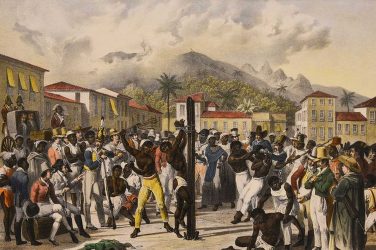Eight Brazilians accused of promoting the Islamic State terrorist organization, as well as other crimes, were sentenced to 15 years in prison by a Brazilian federal court.
The sentence, handed down on May 4th by Judge Marcos Josegrei da Silva of the 14th Federal Criminal Division of Curitiba in the state of Paraná, was the first in the nation based on Law No. 13.260/2016, known as the Anti-terrorism Law.
The investigations that led to the trial were executed in 2016 by the Federal Police (PF, per its Portuguese acronym) in the scope of Operation Hashtag.
From phone taps, the police traced information on social networks and websites, as well as messages by a group called Jundallah (“soldiers of Allah”) in the Telegram app, in which the members showed open support for the ideas and practices of the extremist Islamic organization.
Operation Hashtag even revealed conversations about an intent to carry out a terrorist attack during the Olympic Games in Rio de Janeiro, held August 5th to 21st, 2016, and the purpose of a face-to-face meeting of the group members for the training and preparation of a future migration to Syria, and other regions under the control of the Islamic State of Iraq and Syria (ISIS).
In view of these findings, the PF carried out its first strike on July 21, 2016, two weeks before the start of the sporting event. Ten suspects were arrested.
“We were able to provide a satisfactory response to what was happening, both through the arrests on the eve of the Olympics, as well as now, with this sentence, which has expressed a judgment that is proportional to the seriousness of the actions,” stated Federal Prosecutor Rafael Brum Miron of the Office of the Attorney General in Paraná.
Miron was the official who filed the official complaint accepted by Judge Marcos Josegrei, initiating the trial against some of those involved in the activities uncovered by PF.
For the prosecutor, the Anti-terrorism Law completed a year earlier in March, made it possible to tackle any terrorist act ahead of time. But even so, he believes that the legislation needs to be improved.
“The law could be improved to cover a larger role for acts that constitute terrorism. I often say that people shouldn’t have to wait for the terrorist to gain experience in order to fight him. This is a form of evil that we need to root out,” Miron said.
Promoting Terror
Operation Hashtag was overseen by the Anti-terrorism Division of the Federal Police (DAT, per its Portuguese acronym), which is part of the Police Intelligence Directorate of the institution.
The work of the Brazilian police is supported by the U.S. Federal Bureau of Investigation (FBI), which sent a memorandum to DAT on May 6, 2016, with information “relating to persons based in Brazil who use their social media accounts to express support for the Islamic State in Iraq and the Levant.
“It is the assessment of the FBI that these persons may represent a threat to national security and to the 2016 Olympic Games in Rio de Janeiro,” according to the text of the document.
Among those whose names were provided by the FBI, three were arrested in Operation Hashtag. Another 12 suspects were arrested between July and October of last year in the context of that operation. These individuals were sent to Campo Grande Federal Penitentiary in Mato Grosso do Sul state.
Out of the 15 men investigated, eight were charged and held for trial and sentenced. The trial concluded with them being found guilty of the crimes of promoting a terrorist organization and criminal association.
Leonid El Kadre Melo, one of the defendants who appeared on the FBI list, was also sentenced for the crime of recruitment for the purpose of carrying out acts of terrorism. Found by Judge Josegrei to be the “top leader” among those involved, Melo received the heaviest sentence – 15 years, 10 months, and five days in prison.
“There is no doubt as to his role in, and leadership of, the group. His actions, through constant and effective messaging, promoted acts favorable to ISIS, frequently encouraging everyone to take matters ‘into their own hands’ in support of the terrorist cause, united in committing various crimes to finance terrorist acts, and for their own future migration to the ‘caliphate’ region,” the magistrate stated during sentencing.
Alisson Luan de Oliveira, another person on the FBI’s list, was sentenced to a maximum of six years and 11 months in prison. During his trial it was noted that the defendant “stated more than once that he had made a bayat [sworn an oath to the leader of ISIS] and said that the Olympics would present a great opportunity to carry out terrorist attacks and suggested that a mass-extermination project be performed by poisoning a water treatment plant in Rio de Janeiro during the period of the games.”
Luís Gustavo de Oliveira was sentenced to six years and five months in jail. Levi Ribeiro Fernandes de Jesus, Hortêncio Yoshitake, Israel Pedra Mesquita, and Oziris Moris Lundi dos Santos Azevedo — the third defendant identified by the FBI — were sentenced to six years and three months in prison.
The lesser sentence was given to Fernando Pinheiro Cabral, who must serve five years and six months of incarceration for the crime of promoting a terrorist organization.
He is the only one of the eight defendants not found guilty of criminal association, a crime defined under Brazilian’s penal code, which, according to the magistrate in this case, “stems from the fact that the accused formed a stable group whose purpose was the commission of the most diverse crimes.”
New Charge
In addition to the official complaint brought before the court last year against the eight individuals who have now been sentenced, the Federal Prosecutor’s Office, through Miron, at the time asked that alternative measures be applied to six other people under investigation in Operation Hashtag.
“At the time, we didn’t discern an evidentiary basis that warranted their arrest,” the prosecutor recalled.
Miron said that they remain subject to alternative measures, such as the use of electronic ankle bracelets as a way to ensure minimal monitoring of their activities.
“The PF had already concluded Operation Hashtag and sent us the report. We are currently reviewing the material to draft a new complaint,” the prosecutor clarified.
Depending on what is taken into account in that document, the six people under investigation will, or will not be answering for actions linked to terrorism.
This article appeared originally in Diálogo – https://dialogo-americas.com/














